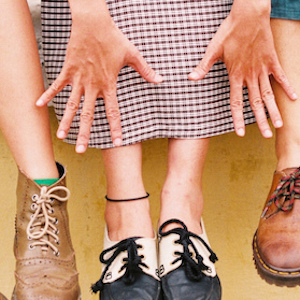The Sisterhood

Take a deep breath. Call out all their names at once, SusiePattyBettyJoNancy! Listen for the clatter of screen door, the scuff and stomp of little-girl feet. Watch the knot of them tumble in together as if attached—four nuclei surrounded by one cell wall. Guess their adventure by the scent clinging to their coats: licorice—a knock on Mrs. Shimone’s back door to beg for Biscotti; manure and hay—a sneak up the hill to the Rotundis’ farm to poke fingers in the chicken coop. Feed them fried bologna sandwiches on Wonder Bread with yellow mustard, or peanut butter and jelly (crusts off), or grilled cheese with Velveeta cut off a rectangular block. Potato chips from a tin can, glasses of milk in old jelly jars.
At night, put them to sleep, all in the same room, so stuffed with beds pressed in every corner and the crib pushed against the wall, the dresser must sit in the hallway. Notice the pajamaed chests, the synchrony of their rise and fall. They breathe each other’s air.
Snap a picture in front of the fireplace wearing handmade look-a-like summer dresses, big pastel polka dots, standing oldest to youngest. A staircase of just-washed heads, crooked bangs snipped the night before at the kitchen sink with the sewing shears.
Do the unthinkable. Divide the girls, crack them in half, create SusiePatty and BettyJoNancy by moving Patty and Susie to a roughly finished attic bedroom. This will go to their heads and they will think they are special, alliances will shift and take years to repair. The older girls will claim the upstairs territory as sovereign and make it their newfound mission to keep the younger sisters out.
As soon as they wake up, BettyJoNancy will scale the steps in search of PattySusie only to find two girls who resemble them. Patty and Susie are gone, they will say. They have flown out the window. We are fairies, left behind to tell you not to come up here anymore. Nancy will believe, she will worry, glance nervously toward the window, but Betty Jo will not be convinced. She will note the fairies’ dresses resemble Patty’s and Susie’s Sunday slips, find their makeshift construction paper wands floppy, point out the window is locked shut.
BettyJoNancy will continue their quest to gain access, to make the sisterhood whole again. SusiePatty will resort to lining the top step with rows of silver-headed thumbtacks. They eventually relent, let BettyJoNancy crying into their room, wrap their pricked feet in doll clothes, beg them not to tell.
*
Send Susie to kindergarten, Patty to preschool. Betty Jo, already bitter that she is left behind and not allowed to wear tights every day like the school girls, will be flattened with misery when she discovers Patty’s preschool has real ponies to ride. She blames Nancy somehow for this. When the older girls are allowed lessons at Harriet Hoctor’s School of Ballet, replete with sparkly recital costumes, Betty Jo becomes bereft. She shakes Nancy off.
Instead of pushing doll carriages up and down the dirt driveway with her little sister, Betty Jo now studies how to be older. While Patty’s at school, she sneaks her feet into Patty’s black ballet slippers, slides the soft soles across the wood floor, enjoys the pinch of elastic across the top of her foot. She places her heels together, toes out as far as she can stretch, arms in a dainty arch above her head.
Nancy tells.
Patty hides her ballet gear.
Betty Jo does not yet have the language to describe the feeling that consumes her except that it lies somewhere between mad and want. She wakes up every morning with the twitch of it in the corners of her eyes. It grows through the day like shadows.
*
Give Patty and Susie a half-hour later bedtime, permitting them to watch My Favorite Martian. All of the girls now cross the street to attend Washington Elementary School. Separate grades with separate friends. At home, loyalties are in constant flux. Betty Jo vies to be Patty’s favorite sister, Patty, Susie’s. Nancy, who never lost her baby fat, is resented by all simply because of birth order and obvious physical imperfection.
Observe them further distinguished by the books they are drawn to. Patty becomes Harriet the Spy and takes to sneaking around the house in her socks, carrying a composition book to record her observations. Betty Jo wishes she were Laura Ingalls Wilder. She wants to be a pioneer, to live off the land, develops a desperate need for a butter churn, and pretends she lives outdoors, under the pine tree next to the reservoir. Nancy starts out with Pippi Longstocking, but becomes smitten with Irene Hunt’s Up a Road Slowly. Susie, two grades ahead of Patty, skips the preteen Judy Blume phase and lands directly in the midst of S.E. Hinton: That was Then, This is Now, and The Outsiders.
The breakfast table is a battlefield. Watch as they fight over who used the last of the Herbal Essence Shampoo, who took too long brushing her teeth, where is the red hairbrush. Disagreement erupts over whose turn it is to have the Close ‘N Play record player. Nancy would like to know who snipped hair off her missing stuffed dog, Clifford, and left it with a ransom note on her dresser. Insults swirl around bowls of Fruit Loops and buttered toast. Sometimes, if there is enough variety, each girl makes her own private cubby out of cereal boxes. The kitchen will quiet, to a hostile silence, broken only by the click of spoon against bowl.
But after school, especially if outdoors is not an option, the weather is slushy or rainy, marathon games of Monopoly or quadruple solitaire materialize. Hear them laugh, a rare and exotic noise that fills the family room and runs up and down the stairs but lasts only until it’s time to clean up and each sister claims she did it last.
*
Assume they will always find a way back to each other, but what if, in high school, they each disappear?
Susie vanishes behind long-haired boyfriends in loud cars, behind a blue veil of smoke from the soft pack of Marlboros she tucks inside her bra, behind an unnamed fury, behind the slammed door of her tiny bedroom where she punches out short stories on a manual typewriter, tragic stories of teenage love where the boy often dies in a fiery crash.
And what if, because of this, Patty keeps her bed made every day, military tight? And her book shelf alphabetized and dusted, her clothes hung or folded in drawers, her shoes regimented on the closet floor. She keeps quiet, lets her straight As speak on her behalf, dates a similarly noiseless boy all through high school, fades into the background of goodness, helps with the dishes each night, lingers at the dinner table as if to make up for Susie’s brief and cold appearance, stays up late studying, recopying the day’s history notes, organizing her work.
Betty Jo may avoid home, hang downtown, cushion herself with friends who are just bad enough to carry with them the edgy possibility of excitement, unsupervised basements, friends with older brothers to supply them with small baggies of pot. She will carefully cultivate her vices, spend weekend nights stalking the older kids with cars and IDs for six packs of tall beer, sloe gin, and vodka to mix with Tang.
And Nancy? What if she melts away, becomes unrecognizable, thin, grows her hair long then curls the front back like Farrah Fawcett? What if she rivals Patty’s GPA, turns out to be the smart, pretty surprise?
*
Dream them back. Put their hair in pin curls with Dippity-do. Line them up in buttoned Easter coats and church hats, matching patent-leather Mary-Janes. Let them instinctively twine their fingers through the hands of the sister next to them. Plop them in a tub full of Mr. Bubbles, one behind the other and wash them assembly-style. Let them loose in the snow one more time, watch the flap of mittens clipped to jacket cuffs, one tumbling mass of girlhood, who leave behind a yard etched with angeled snow.
*
Dream them forward. Give them marriages and careers and cities of their own. Round them up each year for one long weekend in a tropical place. There will be cold bottles of Chardonnay and Sauvignon Blanc, salty snacks and full confessions on a hotel bed: husbands, kids, jobs, sex. One will bring an old photograph. Four girls in matching velvet dresses in front of the scraggly Christmas tree. The special year when Santa brought the white go-go boots.
Before bed, one pulls out Yahtzee. One refills the wine. Dice clatter in the cups. They are silly from the wine and each other’s presence. Hear them laugh, the sister laugh, the laugh that doubles them over. The laugh that knows each other’s history.
Later, they will fall; into sleep, into an old familiar rhythm, the door connecting the two rooms propped open.
They breathe each other’s air.










